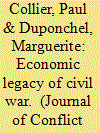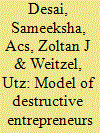|
|
|
Sort Order |
|
|
|
Items / Page
|
|
|
|
|
|
|
| Srl | Item |
| 1 |
ID:
120113


|
|
|
|
|
| Publication |
2013.
|
| Summary/Abstract |
In this article, we provide an introduction to the Special Issue of the Journal of Conflict Resolution devoted to the impact of violent conflict on entrepreneurship in developing countries. First we note that there is insufficient attention in the literature on the impact of violent conflict on the firm or entrepreneur level. Then, after we define entrepreneurship and violent conflict, we provide a summary of the existing literature and give an overview of the contributions in this Special Issue. We conclude by noting policy implications and areas for further research.
|
|
|
|
|
|
|
|
|
|
|
|
|
|
|
|
| 2 |
ID:
120118


|
|
|
|
|
| Publication |
2013.
|
| Summary/Abstract |
This article positions itself among the very rare microeconomic analyses on the consequences of civil war. Up to now, most analyses on this topic are based on household surveys. The originality of the present study is that it investigates for the first time the likely predominant route by which civil conflict affects the economy, specifically through firms. The context of the study is Sierra Leone, a country that was ravaged by violent conflict from 1991 to 2002. The approach is to use geographical variations in the intensity of conflict to estimate the impact of violence on firms, on which we have data from the World Bank 2007 Employers' Survey. The proposed theory is that during conflict, violence affects production through a form of technical regress and demand through a reduction in income. The persistent post-conflict effects are less obvious. We assume that war forces a prolonged contraction in output skills, which slows the pace of recovery. We termed this phenomenon "forgetting by not doing". The results confirm our theory: the size of firms in 2006 is negatively affected by the intensity of the war in the area it operates. The analysis of training needs clearly corroborates the long-lasting lack of skills experienced as a result of the war in areas where the conflict was more intense. Yet, the analysis cannot identify robust recovery patterns.
|
|
|
|
|
|
|
|
|
|
|
|
|
|
|
|
| 3 |
ID:
120119


|
|
|
|
|
| Publication |
2013.
|
| Summary/Abstract |
This article uses two unique panel data sets to study the causal effect that armed conflict has over firm exit in Colombia. Using a fixed-effect estimation methodology at the plant level and controlling for the possible endogeneity of armed conflict through the use of instrumental variables, we find that a one-standard deviation (SD) increase in the number of guerrilla and paramilitary attacks in a municipality increases the probability of plant exit in 5.5 percentage points or .28 SD. This effect is stronger for younger manufacturing plants, with a smaller number of workers and low levels of capital.
|
|
|
|
|
|
|
|
|
|
|
|
|
|
|
|
| 4 |
ID:
120121


|
|
|
|
|
| Publication |
2013.
|
| Summary/Abstract |
This article provides evidence for a particular channel through which sustained terrorism in rural areas may affect growth in developing countries. Using micro-level data from agricultural surveys during the period of insurgency in Punjab (India), I find significant negative effects of terrorism on the level of investment in long-term agricultural technology, but effects are small and insignificant for short-term investment. The presence of a major terrorist incident in a district in a year reduces long-term fixed investment by around 17 percent after controlling for district fixed-effects, time trends, district trends, and other farm-level controls. These negative effects are greater for richer farmers and those living in bordering districts. This results in a farmer losing close to 4 percent of his income annually because of the insurgency.
|
|
|
|
|
|
|
|
|
|
|
|
|
|
|
|
| 5 |
ID:
120117


|
|
|
|
|
| Publication |
2013.
|
| Summary/Abstract |
Entrepreneurship is generally regarded as a productive force of change, innovation, and development in modern economies. Particularly for institutionally less developed environments, however, it has been argued that the same energy and talent can also be allocated to unproductive ends. In this article, we present a model that analyzes the allocation of entrepreneurial talent into productive activities and raiding in Postconflict environments, where most formal and informal institutions have broken down. We show that the distribution of initial wealth and entrepreneurial talent play a decisive role. Our analysis also suggests that microcredits can support the transition to a productive equilibrium, because they help to overcome credit constraints without creating incentives for raiding.
|
|
|
|
|
|
|
|
|
|
|
|
|
|
|
|
| 6 |
ID:
120116


|
|
|
|
|
| Publication |
2013.
|
| Summary/Abstract |
The research on entrepreneurship as an economic phenomenon often assumes its desirability as a driver of economic development and growth. However, entrepreneurial talent can be allocated among productive, unproductive and destructive activities. This allocation has important implications in the developing world, particularly for countries hosting conflict or recovering from conflict. The allocation of entrepreneurship is theorized as driven by institutions. Although the trade-off between productive and unproductive entrepreneurship has been examined, destructive entrepreneurship has been largely ignored. We build from existing theory and define destructive entrepreneurship as wealth destroying. We propose three assumptions to develop a model of destructive entrepreneurship that presents the mechanisms through which entrepreneurial talent behaves in this manner. We present four key propositions on the nature and behavior of destructive entrepreneurship. We conclude by identifying research agendas and policy streams, with a focus on relevance to conflict and postconflict recovery.
|
|
|
|
|
|
|
|
|
|
|
|
|
|
|
|
| 7 |
ID:
120120


|
|
|
|
|
| Publication |
2013.
|
| Summary/Abstract |
Many Colombians are confronted with the ongoing conflict that influences their decision making in everyday life, including their behavior in labor markets. This study focuses on the impact of violent conflict on self-employment, enlarging the usual determinants with a set of conflict variables. Our estimation strategy compares three different estimates: one from fixed-effects panel data (OLS-FE), estimates using lagged conflict indicators instead of contemporaneous regressors, and instrumental variables (IV-FE) estimates. Our results show that a one standard deviation increase in net displacement rates increases the rate of self-employment by about 7 percent points. Dividing the self-employed into different sectors (services and agriculture), we find that net displacement increases self-employment in the services sector but has no effect in agriculture that is affected by attacks by rebel and paramilitary groups, instead. Looking at the income of self-employed individuals, an influx of displaced reduces sharply hourly income in the self-employment sector.
|
|
|
|
|
|
|
|
|
|
|
|
|
|
|
|
|
|
|
|
|